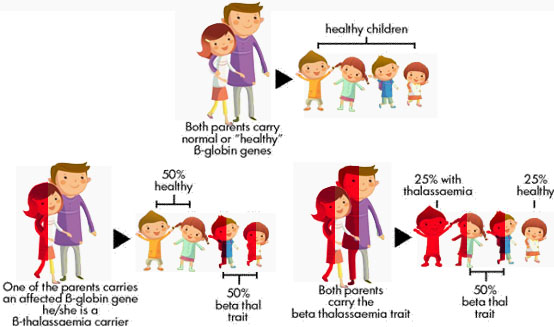 What
is Thalassaemia? What
is Thalassaemia?
Thalassaemia is a
genetic blood disorder whereby the blood cells are unable to carry a
sufficient supply of oxygen for the body’s needs:
• Bone marrow cannot produce normal red blood
cells
• Heart and other organs fail due to lack of
oxygen
• Patients look pale and feel tired all the time
Did you know?
•
Every year, there are about 141-150 beta- thalassaemia births in West
Malaysia.
• 4.5% of Chinese are carriers of alpha-
thalassaemia, and most are not aware of it.
• There are over 2,400 transfusion-dependent
thalassaemia patients in Malaysia.
• At least 80% of thalassaemia major patients do
not live beyond the age of 10 or 20.
• 3% to 5% of Malaysians are Thalassaemia
carriers.
How does it happen?
• It is passed down from healthy parents who are
carriers.
• Carriers do not show any illness but may pass it
on to the next generation.
• People become carriers (known a thalassaemia
minor) when one of the parents is also a carrier.
• People can suffer from thalassaemia disease (Thalassaemia
major) when both parents are carriers.
The problem
arises when two people with the thalassaemia trait have a child
together. Each of them could pass on that half of the information
containing mistakes. If that happens the child will make red blood
cells that cannot carry enough oxygen and this child will have
thalassaemia.

What treatment
is required for patients suffering from Thalassaemia?
A Thalassaemic patient needs Monthly transfusions to replace empty
red blood cells with new healthy ones each time lasts about 4 to 6
hours.
When the patient is given regular transfusions of blood, the
body has enough healthy red blood cells to carry the oxygen it needs,
the bone marrow can stop working so hard. The bones grow normally, the
heart and other organs have less work to do and the patient feels
much better.
To have blood transfusions, the child will have to go to a hospital or
special clinic. Each transfusion lasts about 4 to 6 hours and this has
to be done on a monthly basis.
The patient requires regular blood transfusions throughout his or her
life. The blood transfusions, however, are complicated by a resulting
build up of iron.
Who should be
tested?
It is important for every Malaysian who may one day have offspring to
be aware of there Thalassaemia status.
Many countries such as Singapore, Cyprus and Saudi Arabia have
national screening programmes in place.
Initial screening can be performed on a single drop of blood from a
“finger-prick” collection and checking the samples turbidity when
mixed in a glycerol solution. If the screen is positive, blood can then
be sent to the laboratory for a full thalassaemia test.
|